Departments
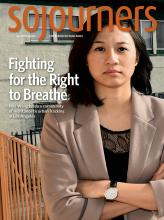
HERE'S A PARADOX: If justice delayed is justice denied, we cannot rest while anyone suffers; at the same time, we can’t work tirelessly for justice without rest. It’s the kind of pesky conundrum we face just as we’re settling in for a night of sweatpants and Netflix: The prophets in the Bible decried those who sit on fine couches while their neighbors go hungry ... but does that mean it’s wrong to re-watch the entire season of Queer Eye when we could be doing something more productive?
In this issue, Baptist minister J. Dana Trent uses the fourth commandment (“Remember the Sabbath day, and keep it holy.”) to reframe our quandary. Through this commandment to practice “ritual rest from our labor,” writes Trent, “we opt out of tyranny and opt into care for one another.” At its heart, Sabbath rest isn’t a pause from justice work; it’s a way of disrupting a culture of what Walter Brueggemann describes as “endless desire, endless productivity, and endless restlessness.”

From Stage to Screen
Pulitzer Prize finalist Anna Deavere Smith brings her critically acclaimed play Notes from the Field to the screen. Based on hundreds of interviews with students, teachers, parents, and administrators, the production brilliantly highlights the disturbing U.S. school-to-prison pipeline. HBO
Love for Creation
Creation Care: A Biblical Theology of the Natural World presents practical, faithful responses to environmental issues. With scientific data and comprehensive biblical theology, Douglas J. Moo and Jonathan A. Moo invite readers to explore their relationship with creation and the Creator. Zondervan

HOLY REST challenges our individualism: It reminds us that we need each other. The manual for discipleship, if it existed, would come with a warning: Do Not Try This Alone. Christianity is fundamentally expressed in community. Jesus formed a community of disciples, he sent the disciples forth in groups, and he promised that “where two or three are gathered in my name, there I am in the midst of them” (Matthew 18:20). The Holy Spirit descended in community, creating church. And our continuous process of conversion is both realized and expressed in community, for, as Tony Kelly writes in The Force of the Feminine, “to be converted, turned out of oneself toward that Universal Love revealed in Christ, is to be turned toward others who, one way or another, support or occasion one’s growth in conversion.”

NO LONGER do I have to separate myself from the victims of society, whether they are in prisons or mental institutions, or the economically poor, unable to buy time, health, space, leisure, education for their children, or a host of other things. I know myself to be victimized, because I am the victim of these powers. I can be at home with other victims.
And I need no longer to be bound by the hurt of ancient wounds in my own life because the penetrating light of Christ can pierce the darkness—the deepest darkness. And no longer need I fear the aging process. It has no destructive power over me. My diminishing powers and your diminishing powers in certain areas are the preparation for a new depth of communion with God, for which I was destined.
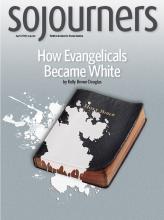
IN THIS ISSUE, Victoria Newton Ford writes about Ava DuVernay’s forthcoming movie adaptation of Madeleine L’Engle’s bestselling fantasy novel A Wrinkle in Time. As in the book, Meg Murry travels through time to find her missing father. But DuVernay, who also directed Selma (2014) and 13th (2016), adds a twist. In the film, Meg and her brother, Charles Wallace, are black. For Ford, this delivers something the novel cannot: “a hero of the universe who, in our current political space and time, is afforded the least agency.” In other words, writes Ford, “Meg is an angry black girl.”
A film that depicts a black protagonist—in all her fury, pain, and love—is especially radical, Ford explains, because America has continually “sought to conscript ... black [women] into a toolbox for the country’s deliverance.” She points to the political heroization of Oprah, Michelle Obama, and the black women voters in Alabama who defeated Roy Moore’s senatorial bid.

MANY politically conservative evangelical Christians have been not too subtly transforming God into a transcendental member of the right wing of the Republican Party. It is not just a matter of their making a biblical case for their political agenda; they seem to be going further than that. They are giving the impression that anyone who disagrees with their agenda is outside the will of God. These people have been so effective in associating evangelical Christianity with right-wing Republicanism that to the secular press the word “evangelical” has come to mean the Christian Coalition.
This recent development has generated great consternation among many of us who, over the last few decades, have used the word “evangelical” to establish our own religious identity. We now have to ask, Can we continue to use that title? We hold to the orthodox theology of evangelicalism, but we are not about to buy into all the values and programs espoused by the Religious Right. ...

““DRAMATIC, POLITICAL, incendiary.” They seem like words you’d see splashed across the dust jacket of Fire and Fury, the controversial account of the Trump White House that generated a firestorm of presidential tweets when it was released earlier this year. But in this issue, Bible scholar Reta Halteman Finger uses those words to describe an older form of political drama: the book of Revelation.
Despite Revelation’s reputation as a harbinger of doom, Finger explains that the final book in the New Testament needs to be understood as an example of apocalyptic resistance literature, a genre of writing originally “intended to bring hope during times of political uncertainty or persecution.” This hope isn’t rooted in imperial acts of violence; it’s rooted in the victory of the Lamb, slaughtered but resurrected.

WHAT WOULD it take for martial law to be lifted and a genuine democracy to be instituted in the Philippines? The obvious barrier to democracy is the economic stranglehold foreign corporations have on the country and the control the U.S. government exercises through its military and economic aid and military bases. ...
The national foreign debt of the Philippines approaches $11 billion and continues to mount. The country must keep producing Barbie dolls and planting pineapples and bananas on prime land to raise enough foreign exchange to pay the interest on its foreign debt.
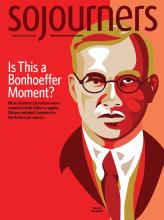
THE PAGES OF this magazine rarely feature scathing reviews, but in 2011 we made an exception.
That year, in our February issue, we published Nancy Lukens’ critique of Bonhoeffer: Pastor, Prophet, Martyr, Spy, by Eric Metaxas. Lukens, a German professor who translated many of Dietrich Bonhoeffer’s works into English, described the book as “stunningly flawed,” and lambasted Metaxas for trying to sculpt the 20th-century German pastor into an evangelical warrior on a crusade against liberal Christianity. Metaxas “does both Bonhoeffer and contemporary readers a gross disservice in implying that evangelicals are immune from the tragic error of merging nationalistic fervor with Christian piety,” wrote Lukens.
Fast forward seven years: Metaxas’ Bonhoeffer biography boasts a bestseller sticker, and a resurgence of nationalistic fervor helped win Donald Trump the White House—and the explicit support of many white evangelical leaders, including Metaxas.

PEOPLE OF faith want to see the media recognize via news coverage that religious expression is a significant American trait. “They want to see religion mainstreamed in the newspaper,” said Stewart Hoover, a University of Colorado expert on religion in the news. When it comes to churches, however, the feelings are mixed, according to a pivotal 1989 study by Hoover. Like other institutions, church bodies want to maintain control over descriptions of their symbols and stories, yet many also desire the validation and credibility conferred by appearing in the news. But going public with their news and views runs the risk of misinterpretation by journalists. ...
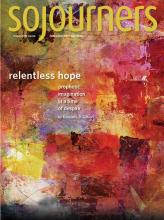
IN WALTER BRUEGGEMANN'S first article for Sojourners, published in November 1983, he described the “radical break” we prepare for in Advent as “the Bible’s effort to break our imagination.”
In the decades that followed, Brueggemann’s keen analysis of scripture has called out some of the darkest practices of American empire, including consumerism, gun violence, financial corruption, environmental exploitation, and sexual assault. But while he’s never shied from speaking truth to power, Brueggemann has repeatedly emphasized that the core of the prophetic vocation isn’t merely to rebuke unjust systems, but rather, as he wrote in 1983, “to think a genuinely new thought, to dream of a genuinely new world that will displace the old failed one.”

THESE ARE fear-provoking and immobilizing times for many who have labored over the years for a more just society and world. Their arms have indeed grown weary, and their knees totter and shake in the face of the present hour. The Bible is unequivocal in its contention that a frightened and trembling people are unable to act and faithfully stand in their hour of trial. Fear saps their strength and leaves them cowering in a corner ...
Isaiah prophesied to a similarly dispirited and broken people. Judah appeared doomed and its future nonexistent. The people were not only anxious about tomorrow but uncertain that they would survive the day. They had lost sight of, and faith in, the promises of God, since all that their eyes could see was desolation and ruin. The prophet challenged them to be strong and to take courage, undergirding one another as they look to the salvation of the Lord. ...
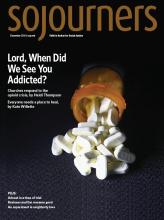
DURING THE HOLIDAYS, many of us go home. But home can be a tricky place these days. Pass the coffee and the pumpkin pie, but could we please skip the conversations with relatives who disagree with us about immigration, racism, climate change, and, well, pretty much everything?
Nope, says Katharine M. Preston in “An Experiment in Neighborly Love.” In a time of intense polarization, “talking exclusively with those with whom we agree simply hardens our positions and makes us angrier,” she writes in this issue. Instead, she challenges us to an “experiment”: gathering people with a wide range of ideological views to listen to one another. Some may see this practice as “hopelessly passive, naïve, and a waste of time,” she admits, but building empathy across the partisan divide could go a long way toward ending the cycle of alienation and frustration that makes people susceptible to fear-based rhetoric.
Our cover story offers another kind of homegoing.
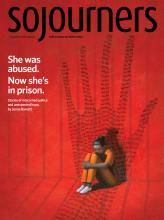
IT'S NOT ONE of the Bible stories people often talk about. The tragedy of Tamar, a young woman who was raped by her half-brother and told to “be quiet” while those in authority refused to seek justice on her behalf, is recounted in 2 Samuel 13. We learn in scripture that Tamar became “a desolate woman.”

THE MAJORITY of Generation X Latinos perceive that our faith sects (both Catholic and Protestant) have little to say about the issues that affect us most: technology-induced future shock, a national debt as frightening as a velociraptor, AIDS, and (perhaps most important) race and identity. What better way to explain the phenomenon of countless young Latinos leaving—in their own words, escaping—our religious institutions?
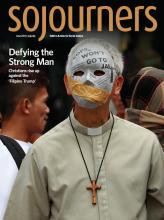
“My hope for the future is that the church will be an authentic witness to the gospel despite the cost,” Filipino Bishop Francisco F. Claver, SJ, told Sojourners in 1979, “even if it means being crushed.” In the decades that followed, Sojourners reported the involvement of Filipino Christians in the People Power movements against repressive regimes that were often aligned with U.S. military power. Christians who spoke out were branded as communists. Many were tortured and killed by the military or vigilante groups.
But the Filipino church, though pressed, was never crushed. “I’ve been very encouraged by what I have seen in our people,” Karl Gaspar said in a 1988 issue of Sojourners. Gaspar—a Filipino poet, Redemptorist brother, and longtime friend of Sojourners—spent two years in prison in the early ’80s under the regime of Ferdinand Marcos. Yet he remained hopeful, “convinced that God is present despite all that which would negate God’s presence in this village.”
In this issue, Eric Stoner reports on faith-based opposition to Rodrigo Duterte, the Philippines’ president who positioned himself as a “tough on crime” political outsider and declared himself “happy to slaughter” the nation’s 3 million drug users—and seems to be making good on his promise.

AS SOME of you have no doubt already heard, the Post American [the original name for Sojourners] and our entire community will be moving, in early September, from Chicago to Washington, D.C. ... The Post American, first published in late 1971, began as a quarterly tabloid and has developed into a monthly magazine with a broadly ecumenical, national, and international readership. ... The final decision came less through an analytical process of weighing the pros and cons and more as a result of a growing sense among us all that Washington, D.C., was the right place for us to be.

CAN THE words “Christian” or “faith” appear in proximity to political issues? And if they do, what should they mean? On May 23, a delegation of U.S. Christian leaders came to Washington, D.C., to proclaim to the press and the country’s political leadership that yes, faith and values are vital to the public life—and if they are genuinely expressed they should transform our discourse, policy, and social fabric. What true biblical faith doesn’t do is let religious conviction be manipulated by partisan politics.
“America is fed up with what many in the church are doing, polarizing us into Left and Right. Christians are called to a politics of reconciliation,” said Tony Campolo at a press conference held that morning. ...

Jesus was a feminist, that is, a person who promotes the equality of women with men, who treats women primarily as human persons and willingly contravenes social customs in so acting. The gospels give no evidence of Jesus ever treating women as inferior to men. When the restricted state of women in the Palestinian Judaism of that time is recalled, even this mere absence of a male superiority attitude is extraordinary. ...
